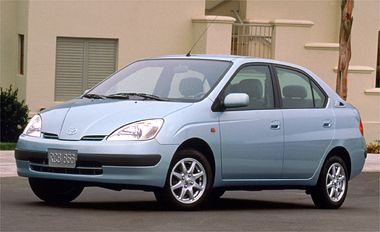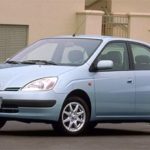Overview:
This week we’re looking at the 2001 Toyota Prius Hybrid gas / electric car. You may remember the review in the past few weeks that I did on the Honda Insight version of these first of a kind hybrid cars that employ a combination gas and electric system. The obvious purpose of these cars is to affect better gas mileage and economy. Why, you ask, is it that these cars must come from Japan? I asked the same question and am appalled that U.S. carmakers haven’t taken the lead in this technology.
What about the Saturn EV1, you say? What about it? That is a feeble attempt that is a sham, in my angry opinion. Ok, we should forgive the idiots responsible and I expect they will wake up to reality in the future. I wonder if there is just too much special interest money suppressing the development of gas efficient cars. But as I said before, when gas goes to $4.00 a gallon, people will once again embrace anyone’s competitive product that gives them more for their money.
I won’t digress too far, but consider the fact that gas prices have been adjusted in this country in devious ways in the ‘70’s, ‘80’s and now in the year 2000. You can’t tell me the small amount of oil coming from the OPEC countries can be blamed for this artificial adjustment. And I don’t think it fools too many others “mad as hell and we don’t want to take it any more” folks paying BS prices at the pump. Fact – the U.S. has the largest developed oil reserves in the world. Fact – the latest Alaska finds, albeit dirtier crude and more expensive to refine, equals by some accounts 30 years of OPEC oil. Wow, who’s trying to fool whom?
Ok, I’ll get off my soap box and tell you why this is a great car, although I think you’ve already guessed.
Handling & Performance:
No different from most gas cars you’ve driven, except you’ll notice no change in gears because of the continuously variable automatic transmission. I’ll bet, aside from the quite engine / battery combination, you won’t be able to tell the difference from driving gas only competition. The Prius starts out on battery and switchs to the gas engine at higher speeds and depending on the load. That explains why the EPA stats are better in town than on the highway. That’s opposite to all other cars, including the Honda Insight Hybrid that starts off on the gas engine and is assisted by the battery when the throttle demands more power.
Styling:
Worse than cookie-cutter. The aerodynamics likely dictate the design for mileage reasons and I guess economy cars seldom have that Beverly Hills flair anyway. I think they could have done better and should have looked to Italy or the US for some ideas. However, from my experience in Japan the consumer is less interested in fashion and fads. They use cars for transportation and we use them to make a personal statement. We’ve been convinced that “You are what you drive”. On the other hand, that attitude difference may have more to do with the price of gas being so much higher in Japan, and I suspect when prices go higher here, we’ll lose the BMW and Mercedes Benz bent.
Fit and Finish:
Good. Well, they come from Japan where the work force is still number 2, so they try harder. It’s either that or they care more. What do you think? Why do the Japanese consistently produce more reliable cars?
Conveniences:
Better than the Honda Insight plus you get to carry three more passengers. You get a lot more for the money.
Cost:
The same as the Insight, but gas performance is not as good, so effective cost is more. However, if you need more than a two seater, this is the better option for cost to value benefit. Too much difference from gas only competitors like the Chevy Metro.
Recommendation:
Although the two gas / electric options for 2001 both tout high mileage, they must be driven carefully to get that kind of performance. But comparing EPA numbers of all cars puts all on the same playing field. The Chevy Metro boasts nearly the same mileage as this Prius and you can buy it for a lot less money. I consider this the main drawback to buying one of these early alternatives to all gas cars.
The competition:
Chevrolet Metro $9,235-10,600, Honda Insight Hybrid $18,880, Hyundai Accent $8,999-9,699, Suzuki Swift $9,099-10,099, Volkswagen Golf $14,900-17,900.
Good News:
Great gas mileage, roomy, comfortable, quiet and smooth ride, well equipped, gas / electric operation is transparent to the driver and you don’t have to plug it in since the gas engine and brakes recharge the battery automatically.
Bad News:
Too new to know what mechanical problems loom out there in the future, even though it has been sold in Japan for a few years. In addition Toyota must be confident enough, or is trying to build consumer confidence by offering an 8-year / 100,000 mile warranty on the battery and hybrid power system, styling could be better, too much money for the economy difference over gas only cars.
Standard Equipment:
1.5 liter 4 cylinder 70 horsepower gas engine, hybrid system including transaxle, inverter and battery providing about 40 horsepower, two magnet motor generators, front wheel drive, continuously variable automatic transmission, power front disc brakes with regenerative anti-lock system, dual air bags, keyless entry with security, power mirrors, climate control, power windows and door locks, AM/FM with cassette and filtration system.
Gas Stats:
52 City and 45 Highway MPG.
Pricing:
MSRP $19,995.
Your comments are welcomed. My e-mail is joe@atthewheel.com
Copyright © 2000 – Automotive Love Affair










